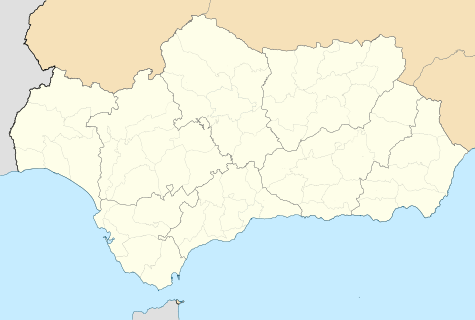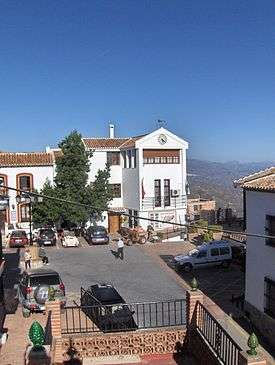Comares
| Comares | ||
|---|---|---|
 | ||
| ||
 Comares Location in Andalusia | ||
| Coordinates: ES 36°51′N 4°14′W / 36.850°N 4.233°W | ||
| Country |
| |
| Autonomous community |
| |
| Province | Province of Málaga | |
| Comarca | Axarquía | |
| Government | ||
| Area | ||
| • Total | 25.5 km2 (9.8 sq mi) | |
| Elevation | 703 m (2,306 ft) | |
| Population (2011) | ||
| • Total | 1,636 | |
| • Density | 64.16/km2 (166.2/sq mi) | |
| Demonym(s) | Comareño | |
| Time zone | CET (UTC+1) | |
| • Summer (DST) | CEST (UTC+2) | |
| Postal code | 29195 | |
| Website | http://www.comares.es | |
 | ||
Comares is a town and municipality in the province of Málaga, part of the autonomous community of Andalusia in southern Spain. The municipality is situated approximately 28 kilometers from the provincial capital and 24 from Vélez-Málaga. It is located in the foothills of the Montes de Málaga 703 meters above sea level. Comares is one of the 31 villages that make up the comarca of Axarquía.
It is bordered to the north with Riogordo, to the north, northeast and east with Cútar, to the south with El Borge, to the southwest and west with Málaga and to the northwest with Colmenar.
It has a population of approximately 1,420 residents. The natives are called Moriscosos.
Geography

The population core is located in slight decline, on the crest of a steep mountain at 703 m. The region is full of ravines, hamlets and farms scattered around the mountain. Its highest point is the hill of Mazmúllar (721 m). A dip the end of the rivers Cuevas or Benamargosa feeds the streams of Cútar, Fuente Delgada and Solano, which are dry most of the year. The town's water supply comes from the springs called Délga, Gorda, Caño Seco and Maroto.
The main economic activity is agriculture, such as olives and almonds. Though in recent years rural tourism has become a major part of the economy.
History
The origin of the name Comares is from the Arabic word Qumaris or Hins Comarix, which means "Castle in the height." Comares was not founded by the Arabs, but by the Greeks and Phoenicians who arrived on the coast of Málaga in the seventh century BC. It was a Moorish fortress since the eighth century CE. We also know that was one of the defensive bastions of Omar ben Hafsun in his fight against the Umayyad Caliphate of Córdoba. It was considered one of the strategic points of the Rayya (Archidona), then capital of the taha of Malaga.

Coordinates: 36°51′N 4°15′W / 36.850°N 4.250°W
.svg.png)